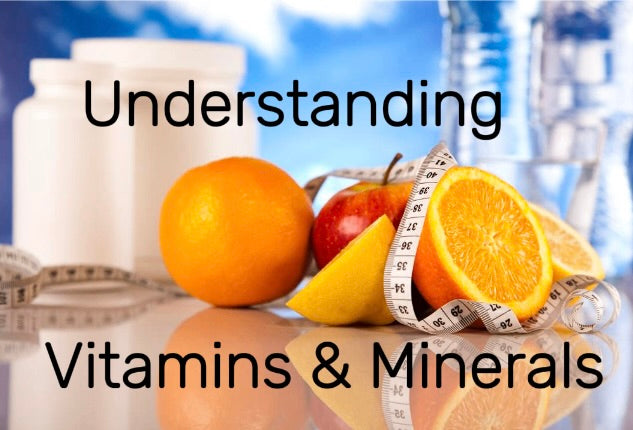
Understanding Vitamins & Minerals: What do they do in the body?
Share
Are you feeling a little lost when it comes to vitamins and minerals? Don't worry - many adults feel the same way! The body needs a variety of micronutrients, such as vitamins and minerals, in order for it to function properly. But what exactly do they do within our system? In this blog post, we'll explore how vitamins and minerals contribute to a healthy lifestyle, including their individual roles in the body. Get ready to learn more about these essential dietary components so that you can make sure your health is top priority.
What are vitamins and minerals, and why do we need them in our diets
Vitamins and minerals play a vital role in our body's overall function and development. They are essential nutrients that we need in varying amounts for a healthy and balanced lifestyle. While vitamins boost our immune system, support bone growth, aid in cell and tissue repair, and offer many other benefits, minerals help regulate our body's natural processes and provide support to various organs and systems. The body cannot produce most vitamins and minerals, so we need to get these nutrients from the food we eat or through supplements. Consuming a balanced diet consisting of foods that are rich in vitamins and minerals can help prevent nutritional deficiencies and maintain optimal health.
Different types of vitamins and minerals, including B-complex vitamins, Vitamin C, calcium, iron, and zinc
Our bodies require a wide variety of vitamins and minerals in order to operate at peak performance. Some of the most essential include B-complex vitamins, Vitamin C, calcium, iron, and zinc. B-complex vitamins are a group of nutrients that help convert food into energy, while Vitamin C is key for a healthy immune system and may help reduce the risk of chronic diseases. Calcium is crucial for bone and muscle health, while iron helps transport oxygen throughout the body. Lastly, zinc is important for wound healing and overall immune function. By incorporating a balanced diet packed with these vital nutrients, we can ensure our body is functioning at its very best.
Benefits of getting enough of each type of vitamin/mineral
Getting enough of each type of vitamin and mineral is essential for overall health and wellbeing. Each vitamin and mineral has its own unique benefits that contribute to the functioning of different systems within the body. For example, vitamin C is essential for a healthy immune system, while calcium is vital for strong bones and teeth. Iron helps to transport oxygen throughout the body, while vitamin D helps the body absorb essential minerals like calcium and phosphorus. By making sure you get enough of each type of vitamin and mineral, you can improve your overall health and reduce the risk of chronic diseases. So, make sure you eat a balanced diet that includes a variety of fruits, vegetables, proteins, and grains to ensure that you get all the essential vitamins and minerals your body needs.
Foods that are high in each type of nutrient
Eating a well-balanced diet is crucial for maintaining good health, but it's not always easy to know which foods to choose for the best nutrient intake. Each nutrient plays a specific role in your body, making it essential to consume a variety of foods for optimal health. For instance, calcium is crucial for strong bones, and foods like dairy, soy products, and leafy greens are high in this nutrient. On the other hand, vitamin C boosts your immune system and is found in citrus fruits, berries, and peppers. Zinc is essential for wound healing and is abundant in meats, seafood, and beans. Iron is needed for healthy blood cells, and you can find it in red meat, leafy greens, and fortified cereals. Incorporating nutrient-rich foods into your diet can boost your overall wellbeing and keep you feeling your best.
Signs that your body may be deficient in certain nutrients
Our bodies require various nutrients to function at their best, but sometimes we may not be getting enough of what we need. If you notice that your hair has become brittle or you are experiencing constant fatigue, then you may be deficient in iron. On the other hand, if you find yourself struggling to fend off infections or constantly having coughs and colds, then you may be lacking in vitamin C. Other deficiencies can show up in the form of muscle cramps, a weakened immune system, or unusual cravings. It is important to pay attention to these signs and ensure that you are getting the right nutrients through a balanced diet or supplements if necessary.
How to track your intake of vitamins/minerals to ensure you're getting the right amount
Keeping track of your vitamin and mineral intake can be key to maintaining a healthy lifestyle. With so many different types of supplements and food sources available, it can be overwhelming to know if you're getting the right amount of everything your body needs. One way to stay on top of your intake is to start a food journal or use a tracking app to monitor the vitamins and minerals you consume each day. By doing this, you can identify any potential deficiencies and adjust your diet accordingly. Whether you're looking to boost immunity, increase energy levels, or support overall health, taking control of your vitamin and mineral intake can be a great first step towards reaching your goals.
Supplements - when is it appropriate to take them and how long should you wait before taking a supplement
Supplements have grown in popularity over the years, with people increasingly turning to them for better health. However, not all supplements are created equal, nor should they be taken on a whim. To decide on when to take a supplement, several factors should be considered, such as your diet, lifestyle, and overall health status. Moreover, the timing of taking supplements can also impact their effectiveness. For instance, some supplements are best taken with a meal, while others are more effective when consumed on an empty stomach. As a general rule, it's important to wait at least two hours between taking different supplements to avoid interactions and to allow for proper absorption. Ultimately, it's best to consult with a healthcare professional before embarking on a supplement regimen to ensure it aligns with your individual needs and is safe for you to take.
Now that you’re aware of the different vitamins and minerals, what they do for your body, how to take them in natural form through food, and when supplements are necessary when our diets aren’t enough, you can take the necessary steps to ensure that you’re meeting your body's daily requirements. It all begins with setting up a healthy basic diet that is balanced and that contains varied amounts of fruits, vegetables, lean proteins, legumes, whole grains and healthy fats. Then if your diet still isn’t giving you enough vitamins/minerals then tracking them in a journal or an app and addressing any potential deficiencies accordingly. Don’t forget about talking to your doctor as well if your dietary changes fail to address any problems. Lastly don’t forget about self-care and taking time for yourself - remember it all starts with nourishing your body both inside and out! So go ahead, make the changes today for optimal health down the line!
